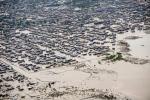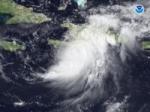What Next for Gonaives?
 The devastation to Gonaives brought with it a sense of déjà vu for Haiti watchers. We’ve been here before - the damage from Tropical Storm Jeanne was massive. Then as now, there were serious humanitarian needs that donors, non-governmental, and international organizations struggled mightily to meet. Then as now, there were a steady flow of politicians and celebrities. Other disasters happened elsewhere and Haiti again fell of the radar. The long term steps needed to ensure the survival of the city were not taken. Will things be different this time or will a preventable tragedy happen yet again?
The devastation to Gonaives brought with it a sense of déjà vu for Haiti watchers. We’ve been here before - the damage from Tropical Storm Jeanne was massive. Then as now, there were serious humanitarian needs that donors, non-governmental, and international organizations struggled mightily to meet. Then as now, there were a steady flow of politicians and celebrities. Other disasters happened elsewhere and Haiti again fell of the radar. The long term steps needed to ensure the survival of the city were not taken. Will things be different this time or will a preventable tragedy happen yet again?


